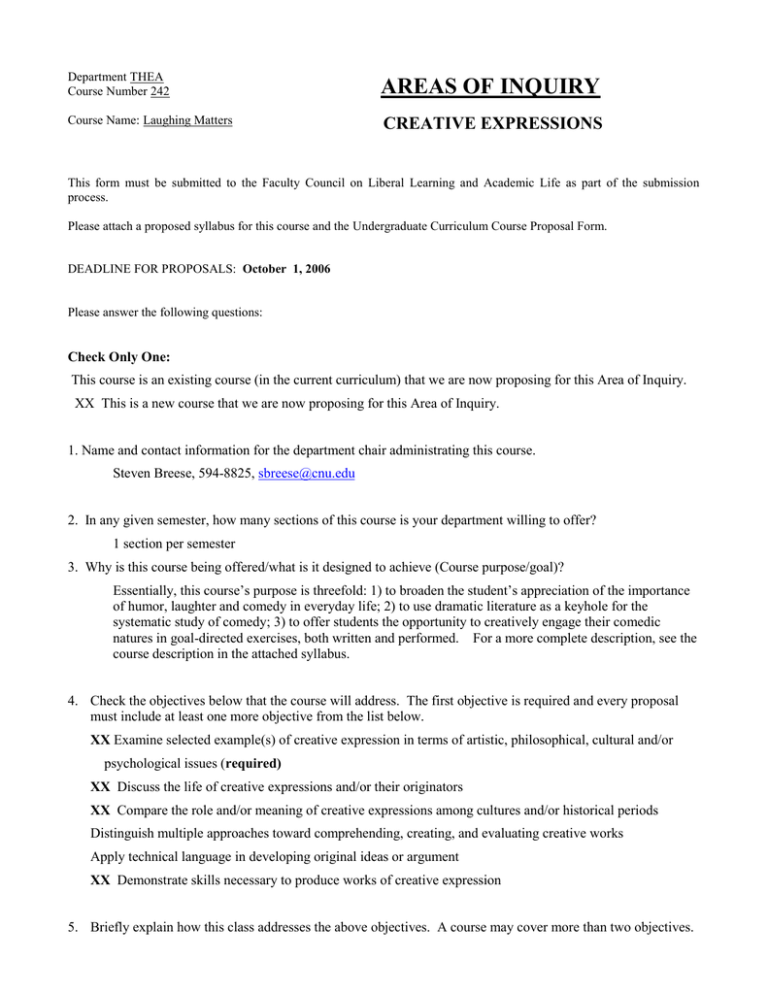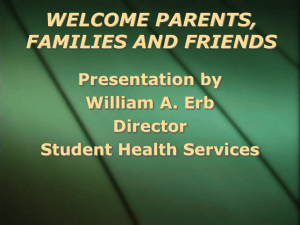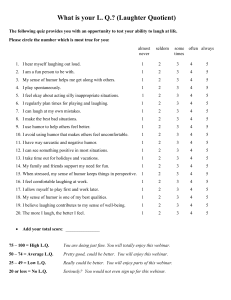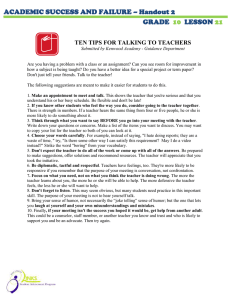AREAS OF INQUIRY CREATIVE EXPRESSIONS
advertisement

Department THEA Course Number 242 AREAS OF INQUIRY Course Name: Laughing Matters CREATIVE EXPRESSIONS This form must be submitted to the Faculty Council on Liberal Learning and Academic Life as part of the submission process. Please attach a proposed syllabus for this course and the Undergraduate Curriculum Course Proposal Form. DEADLINE FOR PROPOSALS: October 1, 2006 Please answer the following questions: Check Only One: This course is an existing course (in the current curriculum) that we are now proposing for this Area of Inquiry. XX This is a new course that we are now proposing for this Area of Inquiry. 1. Name and contact information for the department chair administrating this course. Steven Breese, 594-8825, sbreese@cnu.edu 2. In any given semester, how many sections of this course is your department willing to offer? 1 section per semester 3. Why is this course being offered/what is it designed to achieve (Course purpose/goal)? Essentially, this course’s purpose is threefold: 1) to broaden the student’s appreciation of the importance of humor, laughter and comedy in everyday life; 2) to use dramatic literature as a keyhole for the systematic study of comedy; 3) to offer students the opportunity to creatively engage their comedic natures in goal-directed exercises, both written and performed. For a more complete description, see the course description in the attached syllabus. 4. Check the objectives below that the course will address. The first objective is required and every proposal must include at least one more objective from the list below. XX Examine selected example(s) of creative expression in terms of artistic, philosophical, cultural and/or psychological issues (required) XX Discuss the life of creative expressions and/or their originators XX Compare the role and/or meaning of creative expressions among cultures and/or historical periods Distinguish multiple approaches toward comprehending, creating, and evaluating creative works Apply technical language in developing original ideas or argument XX Demonstrate skills necessary to produce works of creative expression 5. Briefly explain how this class addresses the above objectives. A course may cover more than two objectives. a.) “Examine selected examples . . .” Students will read and discuss comedies by world-famous playwrights. b.) “Discuss the life of creative expressions and/or their originators”: In addition to studying the lives of the playwrights referred to above, the lives and work of various comedians will be studied. In the Topics class, Victor Borge and Robin Williams were featured. c.) “Demonstrate skills necessary to produce works of creative expression”: Students will have several practical assignments, both written and presentational, designed to mine their talent for comedy and to point it toward a target audience. In the Topics course, the class presented an April Fool’s Day celebration of original work at noontime to an audience of fellow students and faculty. I intend to continue this practice. d) “Compare the role and/or meaning . . .”: This will be addressed, in part, through play selection covering various historical epochs. It will also be addressed tangentially with guest lecturers who discuss national humor. In the Topics class, Susan St. Onge, Brana Mijatovic, and Tony Riedl came to class to discuss the varying sense for humor in France, Germany and Serbia. 6. Course Assessment: Identify how this course will accomplish the above objectives (choose at least one). XX Participating in class discussion and debate Engaging in teamwork and other collaborative exercises Writing analytical or evaluative papers, perhaps incorporating original research XX Making oral presentations XX Creating an artistic product or a performance Participating in fieldwork Other means – please identify 7. Attach a proposed syllabus, which includes a statement of purpose, course objectives, and how these objectives will be accomplished. See attached syllabus 8. Please identify and explain if this course contributes to the Foundations of Liberal Learning expectations for: XX Oral Communication Literacy: This course very directly contributes to oral communication skills. Several assignments will require oral presentation. Information Literacy: XX Writing Literacy: This course very directly contributes to writing literacy. Several assignments will require original essays and scripts. 9. Explain how this course connects to Vision 2010 – the CNU Strategic Plan. This class most clearly connects to Vision 2010 under University Priority 1, Goal C, Item 6: Promote and foster artistic creativity and public presentations in the fine and performing arts. Submission Checklist: By the deadline, submit a packet with the following documents to the Assistant Dean for Liberal Learning. Please submit in electronic and hard copy form. XX Area of Inquiry Course Proposal Form XX Syllabus for the Course XX Undergraduate Curriculum Committee Course Proposal Form THEA 242: LAUGHING MATTERS: Comedy, Laughter and the Sense for Humor (Sample Syllabus) Professor George Hillow, 139 Ferguson, 594-8897 hillow@cnu.edu Office Hours: T/Th: 11:00-12:00, 4:00-5:00; Wed: 10:00-12:00; 1:00-2:00 CATALOGUE DESCRIPTION: Everybody loves a good laugh, but nobody takes it seriously. LAUGHING MATTERS examines the crucial role that humor, laughter and comedy play in our lives on a regular basis. Why, exactly, has nature provided us with a sense of humor? What happens when we laugh, and where in our hierarchy of social values do we rank sense of humor? How do we use comedy, humor and laughter as tools? What are the various types of comedy? A diverse body of readings and multimedia materials including plays will serve as the lens through which these questions are examined. Homework assignments will include practical exercises designed to sharpen the student's sense for humor. TEXTS: Laughter: A Scientific Investigation by Robert Provine Lysistrata, by Aristophanes The School for Wives by Moliere Ah, Wilderness! by Eugene O’Neill The Odd Couple by Neil Simon The Real Inspector Hound by Tom Stoppard Cloud Nine by Caryl Churchill SCOPE OF COURSE: Over the semester, Laughing Matters will approach humor, laughter and comedy simultaneously from three directions: 1) the academic, which will largely be discussion oriented and based on formal reading assignments; 2) the first-person, which will challenge students to focus their sense for humor into practical projects and writing assignments; and 3) the appreciative, which will broaden and celebrate perspectives on the role of humor and comedy as manifested both in western history specifically, and in the human experience in general. Because this is, ultimately, a class in theater, plays representative of a variety of epochs and genres will form a textual home base toward which the academic, first-person and appreciative pursuits will converge. Finally, in the interest of integrating the three approaches, Laughing Matters will make extensive use of guest lecturers and materials from film, radio, TV, print media and the internet. THE NOTEBOOK: Reserve several pages at the beginning of your notebook for this class to act as an informal journal. Use it to jot down relevant observations, vocabulary, jokes or thoughts that help define and explain comedy and humor. This will not be collected or graded, but it may serve you well for other aspects of the course. GUIDING THOUGHTS: “We learn through experience and experiencing, and no one teaches anyone anything. This is as true for the infant moving from kicking to crawling to walking as it is for the scientist with his equations. If the environment permits it, anyone can learn whatever he chooses to learn; and if the individual permits it, the environment will teach him everything it has to teach.” –Viola Spolin, theater educator, actress, director, writer, 1906-1994 “Imagination is more important than knowledge. The important thing is to not stop questioning.” -- Albert Einstein “Outside of a dog, a book is man’s best friend. Inside of a dog, it’s too dark to read.” -- Groucho Marx GRADING: Quizzes 30% Final Exam 20% Final Project 20% 4 Structured Assignments (7.5% each) 30% The four assignments described below will be presented in class and evaluated by the class. The class’s five highest rated presentations will automatically receive A’s for the content portion of the assignment; style (grammar, punctuation, spelling, etc.) will be graded separately by the instructor. In other words, the class’s appraisal can only help. Late projects will not be accepted. Should a student have a health or emergency issue and not be able to attend class on a due date, he or she may hand the paper in electronically. If it is received on time, it will receive credit. If not, it will not be accepted and a failing grade will be entered. Quizzes are based on readings and given at the very beginning of class to encourage students to stay abreast of the readings and to arrive on time. Quizzes may not be made up. To cover illness or emergencies, at the end of the semester, the lowest quiz grade will be dropped. Attendance Policy: Attendance is mandatory. To cover illness and emergencies, two cuts are allowed. Beyond that, absence will affect the semester grade at the rate of a letter grade per cut. In extreme situations, some special accommodations may be reached if the student has contacted the instructor in advance. ASSIGNMENTS: These will all be handed in as papers that are printed, double-spaced and carefully checked for grammar and style. Stylistic variations that conscious violate correct grammar are acceptable as long as they are obviously intentional. 1. Telephone sketch: write and rehearse a 90-180-second monologue that is one side of a telephone conversation. This will be handed in as a paper but also presented in class as a monologue. It does not have to be memorized but it should be well rehearsed. Please double-space and print in 16-point font for ease of delivery. You may be yourself or someone else. 2. Satirical Essay: Pick a serious topic that needs improvement and, in your best prose, write a satiric essay of 300-500 words, double-spaced in 12-pt font. 3. Great Work Parody: In 300-500 words, your purpose is to shed comedic light on the difference between men and women, but in doing so, you must parody a great work of literature. “Great” implies something that has been around for a long time and that most people in the class will be familiar with. 4. April Fool’s Day Presentation: You and your partner will rehearse your memorized three-minute act during class, complete with necessary props and costumes. The class will critique each presentation. Feel free to make liberal use of the instructor’s office hours to plan these assignments. FINAL PROJECT: The student will choose either of the following for a final project: 1) A 7-8 page research paper on a previously approved topic which broadens the student’s understanding of some aspect of the course; 2) A 5-minute, memorized presentation given in class on the last day of the semester. EXTRA CREDIT: 1. Students may earn one-third of a grade (turning a B into a B+) of extra credit by attending any one of the following and writing a 300-500-word analysis of the comedic aspects of the production. Please include a program and a ticket stub with the paper. No more than three extra credit projects (one full letter grade) per student will be accepted and the papers must be handed in no later than one week after the event. 1) Moliere Than Thou on Wednesday, Feb. 15 at The Kimball Theatre in Williamsburg; 1-800-HISTORY, students $7.00, for more info, go to: http://www.timmooneyrep.com/moliere_than_thou/index.html 2) The Mikado at The Ferguson Center on Feb. 23, $5, $10 and $15 3) HMS Pinafore at The Ferg, Feb 24, $5, $10, $15 4) The Will Rogers Follies at The Ferg, $15, $20, $25 2. Any student getting his or her caption accepted and printed by The New Yorker in its weekly caption contest automatically receives an A for the quiz portion of the class and is, thereby, exempted from all subsequent quizzes (not the final exam). To learn more, go online at http://www.newyorker.com/captioncontest STUDENTS WITH DISABILITIES: If you have a disability that may affect your performance in this class, please call it to the instructor’s attention at the beginning of the semester and register it with Debbie Witt in the Academic Advising Office and a supportive accommodation will be made. CITIZENSHIP: For communal benefit, this class needs to cultivate a positive atmosphere in which students feel free to explore their comedic potentials. The instructor believes that such an atmosphere requires that topic choices for the four assignments are appropriate for an educational institution and not mean-spirited or disparaging of others. Feedback should be supportive and constructive and never belittling. SEMESTER OUTLINE JAN 17 JAN 19 Introduction and Welcome Quiz DUE: Telephone sketch and a joke Choose a partner for semester projects Read articles from previous class JAN 24 Read Lysistrata JAN 26 Guest lecturer JAN 31 Read “A Modest Proposal” Dr. Strangelove FEB 7 Read School for Wives FEB 2 Dr. Strangelove Partner Project: research assignment FEB 9 DUE: 300-500-word satirical essay FEB 14 Read Provine: vii-viii, 1-53, 189-215 Victor Borge excerpt in class FEB 21 Read Ah, Wilderness! FEB 16 Guest lecturer: Lorain Cosgrave FEB 23 DUE: 300-500-word parody of a great work that attempts to explain the difference between men/women Vaudeville excerpts viewed in class MAR 2 Radio excerpts in class, Abbott and Costello, Garrison Keillor, etc. FEB 28 Read Provine: 55-97 Vaudeville in class SPRING BREAK MAR 14 Some Like It Hot DUE: Script for partnered Vaudeville routine MAR 21 Read The Odd Couple MAR 28 Read The Real Inspector Hound MAR 16 Some Like It Hot DUE: Final Project topic (no re-do’s) MAR 23 Read Provine: 99-151 Sat, April 1: PHC@6 MAR 30 DUE: Dress Rehearsal April Fool’s Day presentation APR 4 April Fool’s Performance: 12:15-1:00 In-class TBA APR 6 Guest lecturers: international humor APR 11 Read Cloud Nine APR 6 Read Provine: 153-187 TBA APR 20 TBA: (Robin Williams excerpts?) APR 18 TBA: (Robin Williams excerpts?) APR 25 TBA APR 27 DUE: Final Projects If scheduling permits, we will take a trip as a class to Cozzy’s Comedy Club for an evening performance in lieu of a class meeting. UNDERGRADUATE CURRICULUM COMMITTEE NEW COURSE PROPOSAL FORM Is the course being proposed for the Liberal Learning Core? Yes __x___ No _____ 1. Title of Course: Laughing Matters Proposed Course Number (cleared with Registrar): THEA 242 (3-3-0) Prerequisite Courses: If the minimum acceptable grade in a prerequisite course is greater than the default of D-, indicate the grade required _________ and state the reason for requiring this minimum grade (consider consistency across the department): Catalogue Description (including credits, lecture, and lab hours): Everybody loves a good laugh, but nobody takes it seriously. LAUGHING MATTERS examines the crucial role that humor, laughter and comedy play in our lives on a regular basis. Why, exactly, has nature provided us with a sense of humor? What happens when we laugh, and where in our hierarchy of social values do we rank sense of humor? How do we use comedy, humor and laughter as tools? What are the various types of comedy? A diverse body of readings and multimedia materials including plays will serve as the lens through which these questions are examined. Homework assignments will include practical exercises designed to sharpen the student's sense for humor. Is the course cross-listed? If so, what is the number of the other course? NO **A proposed syllabus, including complete text and/or reference information, as well as any relevant information to this decision, must be appended. NOTE: All affected department chairs must sign approval on last page. 2. For whom is the course primarily intended? Explain why it should be added to the curriculum. This is a Liberal Learning Area of Inquiry class for the entire student body. It uses plays as a the base camp from which discussions and exercises launch into broader realms of human existence. 3. If this course is required, append a description of how the course fits into the curriculum. Indicate how it affects hours required for graduation. 4. Has this course been offered previously as a special topics course? If so, when? What course number was used? Yes, Laughing Matters was first offered as THEA 295 during the Spring 2006 semester. 5. Has this course, or one closely related to it, been offered at CNU previously? If so, is that course currently being offered? How does the proposed course differ? When is the last term the old course will be offered? No. 6. What is the anticipated enrollment per offering for the next three years? 57 (19x3) During which term will this course first be offered? Fall 20__ Spring 2008___ Summer 20___ During which semesters will this course regularly be offered? Fall 20___ Spring 2008___ Summer 20___ Print in the _2007-2008_______ (academic year) Undergraduate Catalog. 7. How will the course be staffed? One faculty member, several guest speakers 8. Does the course involve a particular classroom, special equipment, or costs beyond those usually associated with a course at CNU? If so, please explain. No, as long as a smart cart or projection equipment is available. 9. Is the course repeatable for additional credit? If so, is there a limit to the number of times the course can be repeated? (e.g., applied music courses) No. 10. If this course is for an Area of Inquiry a. Identify the Area of Inquiry __Creative Expressions_______________________________________ b. Demonstrate how your course will meet the objectives of this Area of Inquiry Students “will examine creative works both structurally and within a larger context” and they will “produce works of creative expression.” This course was approved by: (Liberal learning core courses must be reviewed by BOTH academic Deans.) Concur Do Not | Concur** Department(s): (1) Date: ________ (2) Date: ________ Liberal Learning Council: Date: ________ CLAS Curriculum Committee: Date: ________ LSoB Curriculum Committee: Date: ________ Dean: Date: ________ Dean: Date: ________ Undergraduate Curriculum Committee: Date: ________ Changes to the Liberal Learning requirements must be reviewed by the Faculty Senate. Faculty Senate President: Date: ________ Provost Date: ________ Distribution by Provost Office following approval: Department Chair(s), UCC Chair, Deans, Registrar ** If “Do Not Concur” is checked, please attach a statement of explanation. Rev. 02/21/06



